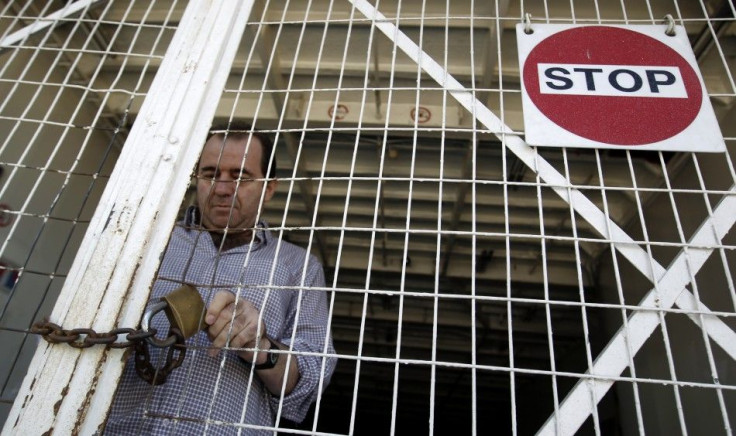General Strike Begins to Shut Down Greece

Greek unions began a 48-hour general strike Wednesday, the biggest protest in years, as Parliament prepared to vote on sweeping new austerity measures designed to stave off a default that could trigger a crisis in the wider Eurozone.
The strike shut government departments, businesses, public services and even providers of everyday staples like shops and bakeries and will culminate in mass demonstrations outside parliament, the scene of violent clashes in June.
Some 400 dock workers gathered at the entrance of Greece's main port Piraeus in the morning and about 1,000 prison guards met outside the Justice Ministry ahead of bigger rallies scheduled for 0800 GMT.
Air traffic controllers decided to soften their labor action to reduce its impact on passengers and stop work for 12 hours instead of 48. They were due to resume work at 0900 GMT.
Since midnight until Wednesday noon, 150 domestic and international flights - arrivals and departures - have been canceled, while 16 flights have been rescheduled, an Athens airport spokeswoman told Reuters. So far, everything is quiet at the airport.
The industrial action comes as European Union leaders scramble to set the outlines of a new rescue package in time for a summit on Sunday that hopes to agree measures to protect the region's financial system from a potential Greek debt default.
Prime Minister George Papandreou made a final appeal for support late on Tuesday, comparing the situation facing Greece to a war and telling deputies in the ruling PASOK party that it was their duty to support the tough new measures.
We must persevere in this war as people, as a government, as a parliamentary group in order for the country to win it, Papandreou said. We will win for the country, we will persevere. That is why I'm here.
Papandreou's narrow four-seat majority is expected to be enough to ensure the bill goes through, especially given possible support from a smaller opposition group. But party discipline has come under increasing strain and one PASOK deputy resigned his seat in protest on Monday.
At least two others have also threatened to vote against part of the package dealing with collective wage bargaining agreements.
Greece has had a foretaste of the protest over recent days as a succession of smaller strikes has left garbage piled in the streets of Athens, closed tourist monuments including the Parthenon and seen government departments including the Finance Ministry occupied by strikers.
We are going to send a loud message to the government and the political system, said Costas Tsikrikas, head of Greece's largest public sector union, ADEDY, which is organizing the strike with its private sector counterpart GSEE.
We believe participation will be huge, he said.
BLACKMAIL
Trapped in the third year of deep recession and strangled by a public debt amounting to 162 percent of gross domestic product which few now believe can be paid back, Greece has sunk deeper into crisis, despite repeated doses of austerity.
European leaders are hoping to secure a rescue deal including new steps to reduce Greece's debt, strengthening the capital of banks with exposure to troubled euro zone countries and leveraging a euro zone rescue fund to prevent market contagion to bigger economies.
Papandreou promised to resist pressure from the streets and prove Greece's determination to save itself.
All these people who are blackmailing and holding up the whole country, by occupying buildings, filling streets with rubbish, shutting down ports, the Parthenon, have to explain to us whether this is helping us stand on our feet, he said.
The austerity package mixes deep cuts to public sector pay and pensions, tax hikes, a suspension of sectoral pay accords and an end to the constitutional taboo against laying off civil servants.
A first vote, on the overall bill, will be held on Wednesday night, with a second vote on specific articles expected some time on Thursday.
None of my colleagues - who have been through a lot lately - will risk letting the country fall from our hands and break, go bankrupt, Development Minister Mihalis Chrysohoidis told Mega TV on Wednesday, saying parliament would pass the bill.
International lenders, who are providing the funds Athens needs to stay afloat after it was shut out of bond markets last year, have expressed impatience at the slow pace of reform as Greece has slipped behind on its budget targets.
There has been growing talk that Athens should be placed under tighter supervision by EU authorities to ensure it meets its reform obligations.
Squeezed between escalating popular protests against the cuts already imposed and demands from the EU and International Monetary Fund for even tougher action, Papandreou's support has appeared increasingly uncertain.
Although the government has repeatedly ruled out early elections, many political analysts now believe that a snap ballot will probably be held some time in the coming months.
Papandreou met Antonis Samaras, head of the conservative New Democracy party, late on Tuesday but failed to garner any support ahead of the vote.
It is obvious who is actually torpedoing the national unity, Samaras said. With someone who is really interested in the unity of the Greek people in this crisis, I would have many things to say. But I have nothing to say with someone who is in panic and taunts everyone.
(Additional reporting by Tatiana Fragou and Daphne Papadopoulou; Writing by James Mackenzie and Ingrid Melander; editing by Philippa Fletcher)
© Copyright Thomson Reuters {{Year}}. All rights reserved.





















